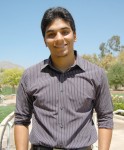Hoping to resolve issues of transparency that emerged within the organization last year, the University of California Student Association board selected Kareem Aref, a third-year UC Riverside student, as its president for this year.
Aref is known among colleagues as a consensus builder and someone who seeks out student input, and seemed a good candidate to the UCSA board to help ensure more transparency and access in the association, said Maryssa Hall, liaison for UCLA to the UCSA Board of Directors and current Undergraduate Students Association Council external vice president.
“I wanted to become the president to make the student voice heard,” Aref said. “There are students across the system who feel disempowered and feel that their voice isn’t being heard. I think … that we really need to do a better job.”
At its annual congress last week, the board voted for the third-year UC Riverside student to replace last year’s UCSA president, Raquel Morales, who is a fifth-year UC San Diego student.
The UCSA is an activist coalition of UC student government leaders and other students that aims to advocate for all UC students on issues like state funding for higher education.
As president, Aref will represent the association at UC Board of Regents meetings and will help oversee the association’s three major campaigns for the upcoming year – about prison spending reform, a tax on oil companies in California and divestment from fossil fuels.
Last year, UCSA’s board came under fire from students after it issued two controversial resolutions. One resolution was issued in opposition to HR 35, a statement in which California lawmakers called for public universities to “unequivocally condemn” all acts of anti-Semitism.
The second came after UC regents announced the nomination of U.S. Secretary of Homeland Security Janet Napolitano as the next UC president. Napolitano was confirmed at the regents’ July meeting and will begin her tenure as president at the end of September.The day the nomination was announced, the UCSA issued a statement in which Morales welcomed Napolitano as the new president.
It later became clear, however, that some students were uneasy about Napolitano’s lack of academic experience and angry about her track record on immigration while at the head of the Department of Homeland Security.
A coalition of undocumented student groups across the UC issued a statement opposing Napolitano’s nomination and said that the UCSA’s statement did not adequately represent their own view of the issue.
Aref said he shares student concerns about the appointment of Napolitano as the new UC president, and that he hopes to talk to more students to get their perspective on the issue.
After both the UCSA resolution responding to HR 35 and its statement greeting Napolitano’s nomination, students alleged that there was a lack of transparency within the UCSA, Hall said.
Hall said that somebody,like Aref, who would prioritize student input was therefore appealing to members of the UCSA board.
“He (is) somebody who I would say is a consensus builder who tries to listen to people,” said Matthew Haney, executive director of UCSA. “He’s a very likable, approachable and warm guy.”
Aref has broad goals, like pushing for more student representation at UC regents meetings and increasing student access to UCSA, but said he would prefer hearing what students want before taking a stance of his own.
“My personal agenda is secondary to what the students want,” he said.
Aref, who has lived in Southern California’s Inland Empire for much of his life, currently lives in Rancho Cucamonga, from which he commutes daily to UC Riverside to save money so he can repay his school loans.
A psychology/law and society student, Aref said hedeveloped the bulk of his experienceworking instudent government – as a fellow for UCR’s external affairs office, UCSA’s secretary and finance officer and a member of UC Riverside’s lobby corps.
As a member of the corps, Aref teamed up with other students to call for more state funding for education and reduced funding for state prisons. The UCSA recently voted to make this one of its major association-wide campaigns for the upcoming year.
Among other things, Aref hasalso lobbied with the corps for a tax on oil companies in California, more student representation at UC regents meetingsand reform of Proposition 13, which sets a percentage limit on the real estate tax.
As part of his presidential plans, Aref said he will soon make a tour around the UC campuses to speak to traditional student government leaders as well as student groups, student journalists and others to hear their input going into the upcoming academic year.
